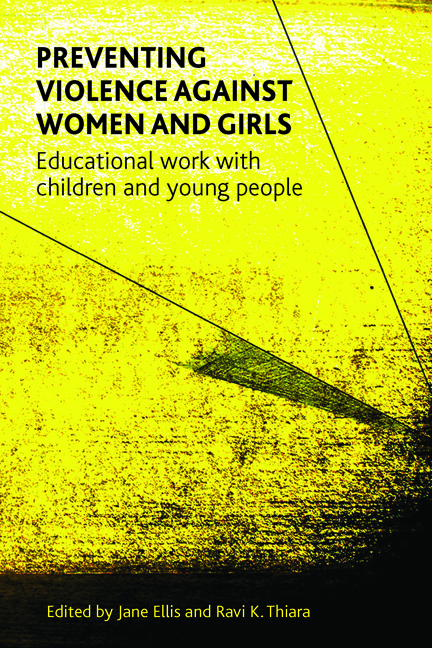Book contents
- Frontmatter
- Dedication
- Contents
- List of tables and figures
- Notes on contributors
- Acknowledgements
- Foreword
- Introduction
- one Preventing violence against women and girls through education: dilemmas and challenges
- two Does gender matter in violence prevention programmes?
- three Responding to sexual violence in girls’ intimate relationships: the role of schools
- four ‘Pandora’s Box’: preventing violence against black and minority ethnic women and girls
- five Preventing violence against women and girls: a whole school approach
- six What did you learn at school today? Education for prevention
- seven No silent witnesses: strategies in schools to empower and support disclosure
- eight Preventing sexual violence: the role of the voluntary sector
- nine ‘Boys think girls are toys’: sexual exploitation and young people
- ten MsUnderstood: the benefits of engaging young women in antiviolence work
- eleven Shifting Boundaries: lessons on relationships for students in middle school
- Concluding remarks
- Appendix: Examples of programmes in the UK
- Index
seven - No silent witnesses: strategies in schools to empower and support disclosure
Published online by Cambridge University Press: 04 March 2022
- Frontmatter
- Dedication
- Contents
- List of tables and figures
- Notes on contributors
- Acknowledgements
- Foreword
- Introduction
- one Preventing violence against women and girls through education: dilemmas and challenges
- two Does gender matter in violence prevention programmes?
- three Responding to sexual violence in girls’ intimate relationships: the role of schools
- four ‘Pandora’s Box’: preventing violence against black and minority ethnic women and girls
- five Preventing violence against women and girls: a whole school approach
- six What did you learn at school today? Education for prevention
- seven No silent witnesses: strategies in schools to empower and support disclosure
- eight Preventing sexual violence: the role of the voluntary sector
- nine ‘Boys think girls are toys’: sexual exploitation and young people
- ten MsUnderstood: the benefits of engaging young women in antiviolence work
- eleven Shifting Boundaries: lessons on relationships for students in middle school
- Concluding remarks
- Appendix: Examples of programmes in the UK
- Index
Summary
Introduction
Imagine …
Being a child in say … the leafy lanes of Cheshire.
Lying awake, night after night, listening to loud arguments and the scary silence that follows.
Being anxious about what might happen to your brothers and sisters if you leave them to go to school.
Being eight years old and running naked down a street at 11.00pm trying to get someone to call the police to help your mum.
Not wanting to go home after school because you fear what might be there or who might not.
Living on the streets because you’re too frightened to live at home.
Believing that the treatment family members endure is all your fault.
Thinking you will turn out to be a violent adult too.
All this but not being able to tell anyone.
These are the consequences of domestic abuse (DA), a key safeguarding issue, as these examples illustrate, for a significant number of children in Cheshire. Many children attending UK schools do not need their imagination to engage with such scenes; for many these images are their reality, their childhood memories and will most certainly impact on their ability to access both teaching and learning and, ultimately, their life chances. It is clear that educationalists have an important role in ensuring that children exposed to DA are identified, protected and supported. Children spend a large proportion of their time in school and their class teacher can be a very significant figure in their lives, especially in primary education. A teacher can be a consistent person who listens in a non-judgmental way, who can effectively signpost them to sources of information and support, and who can alter the course of their lives and of their families.
Cheshire County Council undertook to raise awareness of DA amongst a broad range of professionals and the general public, including young people. A range of services were also provided to meet the identified needs of those affected, with the aim of keeping them safe and, as far as possible, mitigating against harm. Cheshire Education Services embedded DA in its Child Protection training, and they also developed and led a range of personal, health, social, and citizenship education (PHSCE) initiatives, focusing on healthy relationships, in schools.
- Type
- Chapter
- Information
- Preventing Violence against Women and GirlsEducational Work with Children and Young People, pp. 143 - 162Publisher: Bristol University PressPrint publication year: 2014



